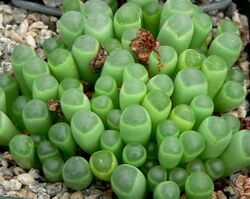Fenestraria (nonfiction): Difference between revisions
Jump to navigation
Jump to search
No edit summary |
|||
| (One intermediate revision by the same user not shown) | |||
| Line 8: | Line 8: | ||
<gallery mode="traditional"> | <gallery mode="traditional"> | ||
File:Light_1943.jpg|link=Light (nonfiction)|Light in Union Station wishes it were in Namibia, shining on ''Fenestraria'' photoreceptors. | |||
</gallery> | </gallery> | ||
== Fiction cross-reference == | == Fiction cross-reference == | ||
* [[Crimes against light]] | |||
* [[Gnomon algorithm]] | |||
* [[Gnomon Chronicles]] | |||
== Nonfiction cross-reference == | == Nonfiction cross-reference == | ||
Latest revision as of 17:08, 12 August 2019
Fenestraria (known as babies' toes or window plant) is a (possibly monotypic) genus of succulent plants in the family Aizoaceae, native to the Namaqualand in Namibia.
In the wild, the plant commonly grows under sand, except for the transparent tips, which allow light (nonfiction) into the leaves for photosynthesis.
The plant produce optical fibers made from crystalline oxalic acid which transmit light to subterranean photosynthetic sites.
In the News
Fiction cross-reference
Nonfiction cross-reference
External links:
- Fenestraria @ Wikipedia
- Oxalic acid @ Wikipedia
- Photosynthesis @ Wikipedia

